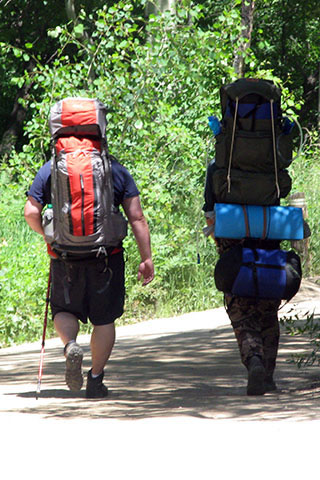| 731 | Self Rescue Be a Lightweight |
2012-11-16 |

Near the end of a hike, these hikers were feeling the weight of their packs.
Do you really want to have a really bad time on a hiking or backpacking trip? Well, there is one sure fire way guaranteed way to make your trip as miserable as possible - carry too much weight.
Now, nobody really wants to carry too much weight. It just happens. As we start the packing process we look at what we need (or what we think we need), pack it, and then find we still have room in the pack for more. Then due to some masochistic reasoning, we begin to look at the 'just in case' items and stuff them into the bag. Soon the pack is full and we are lashing items to the outside. After all, that is why the pack manufacturers included the lash straps on the pack - so we could lash more things to the pack. Finally our packing is finished. It is a masterpiece, crammed with enough goodies to outfit a Boy Scout Troop for a whole week. The only problem is, there are no Boy Scout Troops going on the trip who would help carry the monstrous load.
We try to shoulder the unwieldy pack - hoisting it to a knee and then slipping an arm in the shoulder strap. We tighten every belt and strap on the pack distributing the weight and trying to gain a certain degree of comfort. Of course we are oblivious to why the pack is so heavy - we packed too much stuff!
Carrying a heavyweight pack is work! Not only is the extra weight a burden to move, it is also harder to move. A hiker's body has to work overtime just to stay in balance while carrying a heavy load.
In my youth, I carried heavy packs regularly. The weight of the packs almost crippled me. I used to get huge sores on my hips from the loads. Now days I do not use a waist belt or a chest compression strap. I just avoid heavy packs.
So just what is a lightweight pack?
Without food and water, the lightweight pack should weigh 15 pounds or less for overnight trips and definitely less than 10 pounds for a day hike. Lightweight gurus, would even carry lighter base loads, but be careful to pack smart. Don't forget the essentials and always pack with regards to the weather.
For stocky built hikers, losing weight also helps lighten the overall load. Well, that is if losing weight can be done without losing muscle.
Lightweight tips …
Buy or borrow scales.
Check the predicted weather for the area of your trip.
Talk to the land managers and/or read guide books to help plan the trip.
Online sites also have many resources more current than many books.
Make a list of what you need.
If it is a group hike, designate group gear and share the gear's weight. Group gear could be stoves, cooking gear, tents, large first aid kits, etc.
Pack only what is on the list.
If it is a group hike, check the groups packs as they check yours.
Lightweight gear costs extra money in most cases. Gradually replace heavy items with lighter ones.
The most important thing to change in order to become a lightweight hiker is your mindset. Once you are committed to hiking as a lightweight, you will begin to lighten your load.
Scrutinize every piece of gear.
Weigh every piece of gear.
Learn to be a better hiker and camper. As each skill is refined weight can be confidentially reduced. The skilled hiker and camper can do more with less.
To walk faster and further, you must be lightweight.
Being a lightweight helps the hiker avoid rescues. The lightweight hiker is not as hard on their body (by not carrying heavy weights), they are able to cover more distance in less time, they do not need as much food or water, and they can adjust more easily to other environmental issues like the heat or cold.
Happy Lightweight trails
Down is Optional ... Up is Mandatory - introduction
Self Rescue on Trails - the program
Self Rescue - Plan Ahead - plan to prevent
Self Rescue - Be Kind to Yourself - don't make it hard, make it easy
Self Rescue - Be a Lightweight - walk light and easy
Self Rescue - Avoid Huffing and Puffing - listen to your body and control your speed
Self Rescue - Take a Break - give your body a chance to recover
Self Rescue - No Food, No Fuel, No Fun - feed the motor
Self Rescue - Watch Your Time - always know your location, time, and speed
